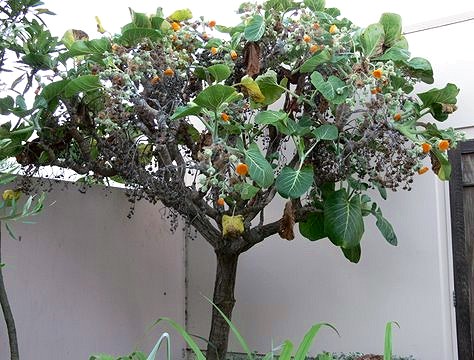There's no evidence for a flood because a global flood would have mixed all of the species together.
That may have been true at first, but there's this thing called liquifaction that can sort layers of sediment, and things within the sediments.
Instead there's a pattern of fossil ancestors in the same place as their living descendants and similar but non-identical species living on separate continents.
There's not.
Also, at least according to the HPT, the earth rolled as it rotated, which is why there were tropical plants found in the mouths of mammoths found in Siberia.
Your beloved hydroplate "theory" posits a giant continent with everything living together.
A giant continent?
Well, no.
Rather the theory posits that the crust of the earth was a complete shell around the entire earth, with chambers of water beneath, and seas, not oceans, on the surface of the crust.
Something like this (not to scale):
How we got to specific groups of plants and animals living on different continents and islands isn't explained by any YEC ideas.
To Eber were born two sons: the name of one was Peleg, for in his days the earth was divided; and his brother’s name was Joktan. - Genesis 10:25
http://www.biblegateway.com/passage/?search=Genesis10:25&version=NKJV
I'm not too sure on the time frame so I'd have to bit of research on it, but even hundreds of years after the flood, the continents were still settling after being raised up (which is why there was an ice age after the flood), and as they settled, the sea level was rising. During that period, the ocean levels were low enough that there were natural land bridges between most of the continents and islands. That's how the animals got there. The species we see today in those remote environments are the descendants of those creatures.
Or why bringing them back together suddenly causes such problems.
Not sure what you mean, here.
What do you mean, "causes such problems"?
If all species were living on one continent just a few thousand years ago, they should all get along fine!
Because you say so?
Because they'd be underwater and being underwater kills plants, especially saltwater. Plants with a broader distribution might be a bit more likely to survive. But a literal year long global flood would kill probably a majority of plant species that are apparent today.
It wouldn't kill the seeds, though. And that's what matters.
Why do distant tiny islands have far more unique species than the mainland? If the islands were all connected just a few thousand years ago, and if only God creates new species
Kinds != species
See the Peleg verse above.
directly and only during the creation week, how can such unique organisms exist?
Not one creationist will deny that species can adapt to their environment. The animals we see today in such remote environments are adapted for life in those environments.
Tree cabbage found only on Robinson Crusoe island.
What does this have to do with anything?


